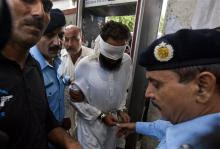Muslim Cleric May Have Damaged a Qur’an to Frame A Christian Girl
September 4, 2012
Pakistani police officers escort blindfolded Muslim cleric Khalid
Chishti to court in Islamabad on Sunday, Sept. 2, 2012. The imam is accused of
planting evidence in a case of a Christian girl accused of blasphemy. (AP
Photo/Anjum Naveed)
(CNSNews.com) – So much for Muslim reverence for the Qur’an. Police in
Pakistan are investigating allegations that a Muslim cleric himself tore out
pages of Islam’s venerated book and added them to burned garbage in a bid to
frame a young Christian girl for supposed “blasphemy.”
Some campaigners are hoping the incident may provide an opportunity for
a government long cowed by Islamic radicals to finally to take stand against
the country’s notorious blasphemy laws and their misuse.
Pakistan has long drawn criticism for laws that have landed thousands of
people in prison, accused or convicted of insulting Mohammed or desecrating the
Qur’an.
The twist in the case of Rimsha, a young girl with Down syndrome accused
of burning pages of the Qur’an with other papers, appears to bear out what
opponents have long been charging – that the laws are frequently abused and
also offer a convenient way to settle scores, even those unrelated to religion.
Muslim clerics in Meherabadi, a slum on the outskirts of Islamabad where
Rimsha lived, called over mosque loudspeakers last month for the girl to be
burned alive, according to the Pakistan Christian Congress (PCC), after
accusing her of burning pages of the Qur’an along with other garbage.
Police arrested and charged her, and when they refused to hand her over
to fired-up Muslims a mob began to attack Christian homes in Meherabadi,
prompting hundreds to flee.
The case appeared to be yet another in a long series of incidents that
end either in accused “blasphemers” sentenced to lengthy prison terms or come
to harm – even death – at the hands of vigilantes bent on punishing them
outside the law, often while awaiting trial.
However, on Saturday police arrested an imam, Khalid Chishti, after
witnesses came forward alleging that he had added two or three pages from a
Qur’an to a shopping bag containing burned papers – supposedly the evidence of
Rimsha’s offense.
One of the witnesses, an assistant to Chishti, told Pakistani television
he had informed the police that the imam had tempered with the evidence in a
bid to bolster the case against the girl. Mohammad Zubair said Chishti had told
him that would help to ensure that the case would lead to Christians’ departure
from the area.
Chishti appeared briefly in court and has been remanded in custody for
two weeks.
PCC president Nazir Bhatti praised Zubair for his “very daring step.” He
urged the government to amend the blasphemy laws, saying they were “being
widely misused to settle personal scores in Pakistan against Christians and
Ahamadiyya communities.”
Protection pledge
Meanwhile a senior Muslim cleric, Mohammad Mehmood Ashrafi, has come out
publicly in support of Rimsha, pledging to make sure the girl will be protected
after her release from custody, whenever that occurs. At a press conference in
Islamabad, Ashrafi also called for a government investigation into the girl’s
arrest.
Offering public support for a blasphemy victim has proven highly risky
in the past: Last year two senior politicians were assassinated after
advocating on behalf of Asia Bibi, the first Pakistani Christian woman
to be sentenced to death on blasphemy charges.
Those two men, however were a liberal Muslim governor and a Christian
federal cabinet minister. Ashrafi, by contrast, is the chairman of the All
Pakistan Ulema Council, a respected religious body. Also, Ashrafi has stopped
short of criticizing the blasphemy law itself, maintaining that the problem
lies in its implementation.
Rimsha herself remains behind bars. A bail hearing has been scheduled
for Friday.
An organization that opposes the blasphemy law and provides legal
assistance to Pakistani Christians, the Center for Legal Aid, Assistance and
Settlement (CLAAS), urged the government to review not just the Rimsha case but
the law itself.
“Blasphemy accusations are extremely serious in Pakistan and the lives
of those accused are often at huge risk from radical Islamists, even if they
are found to be innocent by the police or courts,” said CLAAS coordinator Nasir
Saeed.
“Pakistani President Asif Ali Zardari has ordered an investigation into
Rimsha’s arrest but that is not enough. He must order an urgent review into the
misuse of the blasphemy laws so that there will be no more innocent victims
like Rimsha. If it is found to be true that Chishti planted evidence against
her, then he must be held to account for his actions.”
Saeed also urged
Christians to pray for Rimsha’s safety.
In January 2011 Salman Taseer, the governor of Pakistan’s most populous
province, Punjab, was shot dead by a member of his bodyguard, who said he had
killed the governor because of his support for Asia Bibi and opposition to the
blasphemy laws.
Two months later minorities affairs minister Shahbaz Bhatti was gunned
down in Islamabad by unknown assailants, who left pamphlets accusing him of
blasphemy because of his opposition to the laws.
After the deaths, tentative steps taken by members of the ruling Pakistan
People’s Party towards amending the blasphemy laws ended, and then Prime Minister Yousuf Raza
Gilani assured Islamic leaders that the government would not amend the laws.
Pakistan is currently running for a new term on the United Nations’
Human Rights Council, and critics hope to highlight the blasphemy law among other
rights violations in the run-up to the election in the fall.
The Obama administration has strongly criticized the laws but, like its
predecessor, has repeatedly overruled recommendations by the U.S.
Commission on International Religious Freedom, an independent statutory body,
to designate Pakistan as an egregious religious freedom violator.
